2016 Community Awards Winners
The Howard League Community Awards were presented at the national conference on 30 November 2016. Lord Willy Bach, Police and Crime Commissioner for Leicestershire presented the awards.
Policing and adults category
Winner
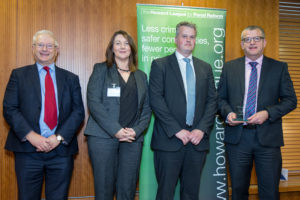 Checkpoint
Checkpoint
Durham Constabulary
Checkpoint is a voluntary multi-agency adult offender diversion scheme within County Durham and Darlington, targeting low and medium level offenders within the criminal justice process, and offering them a credible alternative to criminal prosecution. It gives service users an opportunity to address the underlying causes of their offending, by encouraging them to engage with services instead of going to court.
Checkpoint aims to reduce the number of victims of crime by reducing reoffending, which will also make all our communities safer places. It also aims to improve health and wellbeing, and reduce demand in the longer term on the police and other agencies.
Checkpoint offers eligible offenders a 4-month long contract to engage as an alternative to prosecution. The contract offers interventions to address the underlying reasons why they committed the crime to prevent them from doing it again. The Checkpoint subject is supported through the process by a specialist ‘navigator’ who discusses their needs and agrees a contract. This could include interventions around any of the issues the offender may have.
The project is supported by several academic studies through Cambridge University where knowledge and expertise can be shared around the world.
Runner up
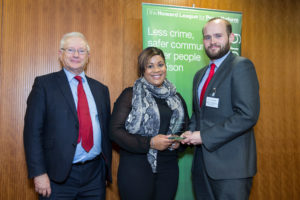
DIVERT
Metropolitan Police Service (MPS)
DIVERT is a police custody program designed to divert 18–25 years olds away from offending and into employment, development and education. The concept was originally designed in April 2015 within Brixton police custody to fill a gap in statutory provision for young adults. This was coordinated by MPS staff and MPS volunteers who would engage with young adults directly in police custody and refer them onto effective employment partners. Within a year they had engaged with 118 people, 48 of which are now in employment. Only 7% of the 118 have reoffended.
In November 2016 the MPS has been working with the Passion Project to deliver DIVERT in Brixton custody using fully funded staff from the Passion Project. Over the next six months DIVERT will be subsequently implemented into further custody suites across London.
Liaison and diversion category
Winner
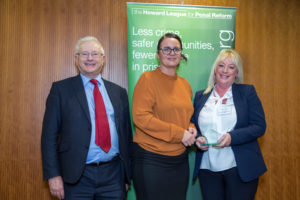
Wakefield Liaison & Diversion
Wakefield All Age Liaison and Diversion
Commissioned by NHS England, Wakefield Youth Offending Team was selected to be one of ten schemes to take part in a national pilot providing an “All Age” Liaison & Diversion service. As a pilot site Wakefield was unique as this is the only scheme from a youth background entering the adult world and the only organisation that is not health trust based.
The service identifies vulnerabilities for adults and young people who come into contact with the criminal justice system at the earliest opportunity. We aim to improve access to healthcare and reduce health inequalities. We divert individuals out of the youth and adult criminal justice systems into health, social care or other agencies that can offer appropriate support. Vulnerabilities that are identified by our specialist practitioners can include substance misuse, mental health, learning disability, domestic abuse, conflict at home and education needs. Assessments can take place in the custody setting, home environment, court and community based venues such as the Well Women Centre. These objectives improve efficiency for youth and adult criminal justice systems, reduce reoffending or escalation of offending behaviours. This has a positive impact on the individual, victims, emergency and universal services and the local community.
Runner up
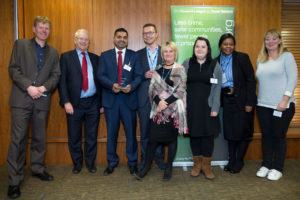
Thames Valley Liaison and Diversion Service
Berkshire Health Care NHS Foundation Trust (BHFT)
Thames Valley Liaison and Diversion (L&D) service is made up of Berkshire, Oxfordshire and Buckinghamshire teams. The aim of the service is to improve early identification of a range of vulnerabilities for individuals who are going through the criminal justice pathway. The service focuses on identification of vulnerabilities, assessments of individuals, and referral and support to engage with appropriate treatment services. These contribute to an improvement in health and social care outcomes, which envisage to positively impact on offending rates. Furthermore, information gained from service users is shared to improve fairness of the justice process to the individual.
The Berkshire service has been in place since 1991 and was identified as a pathfinder service during the development of the national L&D model. The Oxfordshire site is part of the Wave 2 national project which provides an all age, 24/7 model of service. Berkshire & Buckingham are part of the national Wave 3 scheme and currently going through transformation to bring the service in line with the National Operating Model.
The service has won awards as team of the year from BHFT and has been awarded commendations by Thames Valley police for the work undertaken within custody suites to address the unmet needs of this client group. The service user feedback to date highlights the high regards for the support provided to individuals and this is also reflected from feedback received by stakeholders and partner agencies.
Restorative approaches category
Winner
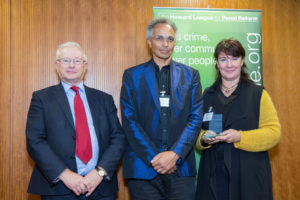
Police/Youth Engagement Forums
Restorative Engagement Forum
This is a nationwide project which brings together groups of police officers with teenagers to look at improving their relationship. Each session has approximately 25-30 participants. It is responding to the Government Paper “It’s All About Trust.” Young people are selected from a wide range of places – youth clubs, youth offending teams, pupil referral units and schools. The outcomes are fantastic, where young people have found a profound shift in attitudes, improved community relations as well as developing skills for conflict resolution.
Officers describe the work in the following way:
“Life-changing, one of the 3 most important days of my policing career.”
“I want to tell you much of an affect the forum had on me, it helped me loads & helped my confidence a lot. Prior to last year I’d have had a knot in my stomach if I had to deal with kids but now I feel a lot more confident – so now I won’t just deal with the adults if I’m called out – I’ll make an effort to catch up with the kids and find out their views. It was hearing it from their perspective and them hearing ours – it made such a difference.”
Runner up
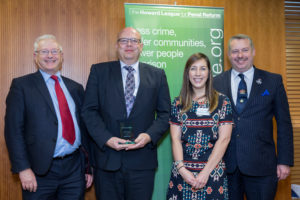
Restorative Justice Hub
Cambridgeshire Constabulary
Cambridgeshire Constabulary and the office of the Police and Crime Commissioner are committed to delivering effective interventions. The introduction of Community Resolutions and latterly the Restorative Justice (RJ) “virtual” hub are key deliverables to identify the underlying causes of criminality and to put in place measures which address these influencing factors, at the earliest possible stages.
Restorative approaches to address early offending were introduced into the constabulary in 2010, through the introduction of Community Resolutions. The offence is seen as the symptom of underlying issues and acts as the trigger to address both. The aims are simple and provide the victim an opportunity to receive an apology, reparation and discuss the impact of the act on both themselves and others. For the offender the objective is equally simple; to address underlying causes of criminality to enable an individual to acknowledge the impact and to re-establish themselves within the community.
The RJ hub aims to provide a referral and co-ordination mechanism for the police, other partners, victims and offenders, to access formal RJ. The hub has found significant benefits for victims even where the offender remains unknown. This is attributed to the assessment process, which seeks to identify emotions associated with the crime and signpost for ongoing support.
Women category
Winner
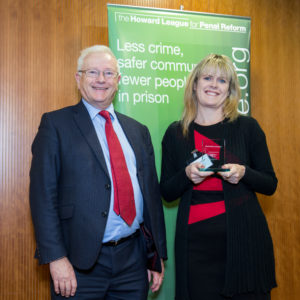 The Good Loaf CIC
The Good Loaf CIC
The Good Loaf is an artisan bakery which carries out activities benefiting the community and in particular to provide employment and training opportunities to offenders and ex-offenders.
Our activities include training; work placements; job opportunities; and operating a café open to the public. By working through our structured work placements, participants gain practical skills and experience in a real work environment. Our team is made up of paid staff, volunteers and women on work placements and we all work together, united in our passion to produce the finest bread in Northamptonshire. We are committed to improving the lives of those who have not had an easy time. Each work programme is twelve weeks long and on successful completion each person acquires a Level 1 AIM Award in Hospitality and Catering, a Level 1 AIM Award in Volunteering and a Level 2 Certificate in Food Safety.
The Good Loaf has been operational for just over one year and has achieved the following:
- Successfully launched a community café
- Run a market stall in the town centre
- Secured 25 trade customers including Northampton University
- Trained 100 vulnerable ladies through our work programme
- Recruited and trained 40 community volunteers who work alongside our service users
- Launched a youth programme
- Won the Local Food Hero Award – Carlsberg Food Awards
- Won the Best Café Award – Muddy Stiletto Awards
- Created 16 new jobs
Runner up
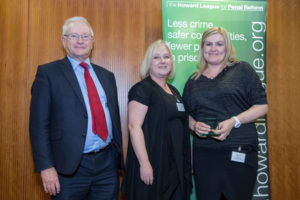
Amber Project
Changing-Lives
The Amber Project works with survival sex workers in Doncaster both on street and off. It provides support to the women and men involved via both an outreach service twice weekly at night in the main area affected and through support within the daytime to work individually with the workers to enable them to attend services for support.
Our project workers begin by establishing a rapport with the women and then we invite women to our centre where we explore the emotional and practical issues that draw them towards sex work. We also examine the risk and harm associated with sex work. We know that the vast majority of sex workers have experienced trauma and sexual exploitation in childhood (in particular, the Rotherham CSE case which has directly affected some of our clients) so we support them to work through this. We also offer very practical sessions on domestic abuse and benefits, for example. Some of this work is carried out individually and some as part of a group. We support women to engage with specialist mainstream services to enable them to meet their multiple and complex needs holistically. We work with women along the journey from crisis and chaos towards stabilisation, recovery, health and resilience by building up positive social networks.
Policing and children category
Winner
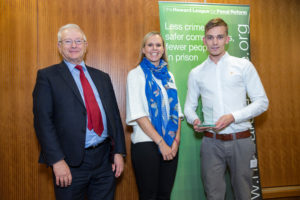
Triage Scheme
Dorset Police
The Triage Scheme is Dorset Police’s response to:-
- School Incidents
An incident that’s committed by a student, on school premises during school open hours, is not serious and doesn’t require an urgent response.
- Youth Internet Safety Incidents
A low level concern involving inappropriate use of the internet by children and young people
The scheme’s aims are to:
- provide callers with informed advice, support and guidance
- support schools in dealing with low level incidents
- reduce crime, anti-social behaviour and wrong-doing by children and young people
- improve crime recording standards
- provide effective and proportionate responses to incidents involving children and young people
- increase satisfaction in Dorset Police
A team of specialist schools officers from the Safe Schools and Communities Team (SSCT) works with young people. The team has extensive experience of working across a diverse range of youth related areas such as bullying, internet safety, anti-social behaviour, drug & alcohol misuse, child sexual exploitation and weapons.
Since 2014 the team has dealt with 2,036. Not only has the scheme improved Dorset Police’s response to School and Youth Internet Safety incidents it has also led to a reduction in children and young people entering the criminal justice system as well as reducing demand on frontline police officer freeing them up to tackle crime.
Runner up
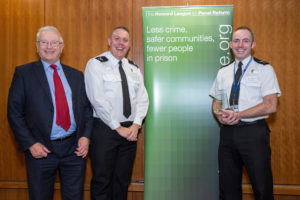
Humberside Police Night Challenge
Humberside Police
Night Challenge is an overnight orienteering experience targeting young people between the ages of 13-18 years old, who have a negative impression of the police, or partner agencies, or are on the cusp of offending. 150 young people in teams of five, walk 13 miles with two walking supervisors representing the Police, Humberside Fire and Rescue Service, NHS and a whole host of partner agencies.
The project aims to educate young people regarding the consequences of their behaviour and actions. It provides an opportunity for participants to spend time with local officers in a challenging environment, building confidence, self-esteem and life skills by being involved and gaining respect for themselves, others and their surroundings. Communication, leadership and team building are also primary objectives. The overall aim is to signpost young people to other activities and pathways for the future. Teams are sourced through community teams, youth offending services, education providers and partner agencies.
Night Challenge 2016 followed a road safety theme including collision and first aid scenes, distraction and substance effects and a courtroom scenario. Pre and post evaluation demonstrated that participants changed their opinions about road safety and the impact of fatal collisions. In 2017, a new theme will focus on cyber bullying and child sexual education.
Criminal justice champion
Winner
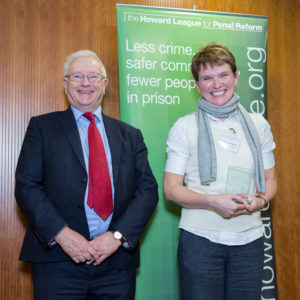 Inspector Gail Spruce
Inspector Gail Spruce
Greater Manchester Police (GMP)
Gail’s tireless work of three years, challenging the culture of arresting officers and custody staff has led to a reduction in the number of children detained overnight in GMP as well as ensuring that those who must be detained are transferred to local authority accommodation. From one pace bed in 2013, GMP now has made great strides in ensuring remanded children are properly afforded their rights.
Successful partnerships with Local Authorities and the PCCs office has led to close working with the Home Office in the development of its Concordat which takes account of GMP good practice and seeks to ensure nationally that the numbers of detained children continues to decrease.
Runner up
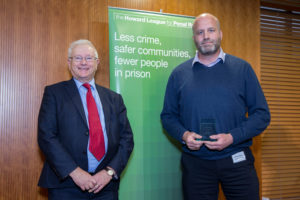
Sgt Steve Hodgkins
Jobs, Friends and Houses Community Interest Company
A social enterprise that does what it says on the tin! The project provides meaningful employment using apprenticeships such as plumbing; plastering; carpentry (jobs); peer inspirational support (friends); and stable quality accommodation (houses). The profit made by the company is re-invested to help support more individuals.
The company started by Steve, is a property construction related business that employs people in recovery (from offending, addiction, mental illness and family breakdown). The strength of the programme is that it has refurbished properties which have subsequently been rented out to members of the team – so they have actually worked on properties they can live in!
In the first year of operation the scheme had a 94% reduction in reoffending, 95% recovery rate from addiction and saved the tax payer over £815k – 2/3rds (38 members) of the team are in recovery; spent over 380 years in prison; and committed over 1200 recorded crimes (cumulatively between them). An evaluation has been carried out by Professor David Best – leading criminologist from Sheffield Hallam University and his team of researchers.
The scheme, under Steve, has won numerous awards since its inception including Inspirational Lancashire business, Innovative business of the year, Regional Apprenticeship award, and social enterprise of the year.
The scheme is run as a business and not a charity, which means it can help challenge and change the social identity of team members which has led to its success – i.e. team members are identified as Terry the plasterer rather than Terry the ex-offender.
Ex-prison minister Andrew Selous MP stated – ‘without doubt Jobs Friends and Houses is the most exciting, sustainable and innovative project I have seen in my time as prison minister’.
The scheme is currently in discussions with Derbyshire, Bedfordshire and Wrexham to roll out their own model of JFH and recently the New Zealand Government has committed to starting their own version.
Organisation of the year
Winner
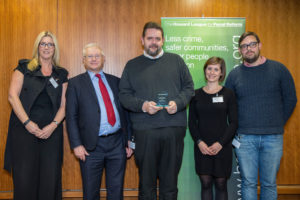
REMEDI: Restorative Services
2016 marks Remedi’s 20th Anniversary. Remedi started in 1996 as one person working from an office that was a converted toilet in Sheffield. We now have 100 staff, 200 volunteers and 100 sessional workers delivering services across England.
Since our inception as a restorative justice service provider we have expanded services to include:
- RJ across ALL offences and ALL sentences in the youth and adult criminal justice arena in the 7 counties in which we currently work
- We are the national contracted provider for RJ by the Homicide Service funded by the MoJ
- Mentoring support services for youth and adult offenders both at the early intervention/prevention stage and for those identified as ‘prolific and priority’ offenders.
- Victim Services (formerly Victim Support services) providing generic support for victims of crime
- Schools based restorative projects- taking restorative approaches to conflicts in and around schools
- Looked After Children restorative services preventing young people from unnecessarily entering the criminal justice system
- Family mediation and family group conferencing services
- Community restorative justice projects to address neighbour dispute and anti-social behaviour.
Since we started and up to April 2016 we have directly supported 147,932 people.
Runner up
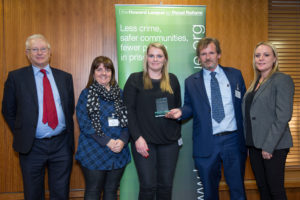
The Nelson Trust
The Nelson Trust is uniquely positioned to enable men, women and girls to enter services at numerous entry points and through a number of integrating pathways be prevented from entering or diverted from the criminal justice system. We work with statutory partners within the police, courts, judiciary, prison service and voluntary sector to effect system change. We enable people to access residential treatment and a range of community programmes to achieve recovery from addiction and address associated issues of homelessness, poverty, trauma, abuse, sex working, debt, unemployment, domestic abuse and family breakdown which are often inextricably linked to patterns of offending behaviour. We believe that with the right support anyone can achieve their full potential. We combine understanding, compassion and expertise to build life changing relationships. Our approach is informed by learning from those we work with who encounter trauma and the most challenging experiences. Over the past year we achieved an 80% success rate of clients completing residential rehabilitation, 82% of whom were, have been or are currently involved in the Criminal Justice system. Women’s Community Services worked with almost 500 women last year, towards achieving sustainable long term successful outcomes across nine pathways of need identified by Corston (2007).
(All photos by PrisonImage.org)
-
Join the Howard League
We are the world's oldest prison charity, bringing people together to advocate for change.
Join us and make your voice heard -
Support our work
We safeguard our independence and do not accept any funding from government.
Make a donation